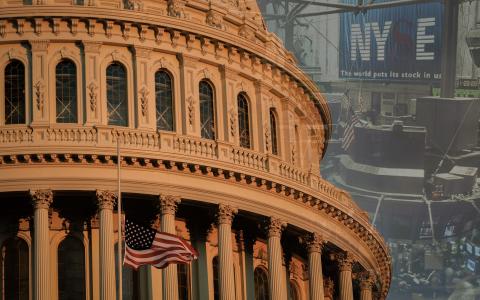
(KOMO News) - Lawmakers in both parties are making a renewed push to address stock trading for members of Congress, a move that is widely supported by the public but has been difficult to get a bill addressing to the president’s desk.
Several bills have been introduced during this Congress targeting lawmakers’ stock trading that would add steps to address a perceived lack of transparency and reporting guidelines or outright ban the practice altogether.
One bipartisan effort in both chambers unveiled last week is the Ending Trading and Holdings in Congressional Stocks, or ETHICS Act. The measure is being led by Democratic Sens. Jeff Merkley of Oregon and Sherrod Brown of Ohio in the Senate and by Reps. Raja Krishnamoorthi, D-Ill., and Michael Cloud, R-Texas, in the House.
The ETHICS Act would prohibit members of Congress, their spouses and dependent children from owning or trading securities, commodities or futures.
“Congressional stock trading is deeply corrupt. We are elected to serve the public, not our portfolios. And no member should vote on bills biased by the character of their holdings,” Merkley said in a statement.
Another bipartisan bill introduced in the House by Reps. Nancy Mace, R-S.C., and Angie Craig, D-Minn., would prevent certain federal employees and elected officials from financial trading while on federal property or using government resources.
In a statement to Fox News previewing the bill, Mace compared trading stocks while on government property to gambling and soliciting campaign donations, which are already banned.
"Introduced the Prohibition of Financial Trading on Government Property Act - ensuring the government is working when we’re on your dime, not trading stocks," Mace said in a tweet last week.
The bills come after reports of lawmakers selling off banking stocks in the fallout of the collapse of Silicon Valley Bank and Signature Bank, an incident that has again raised questions about lawmakers abusing knowledge from their positions for financial gain.
Momentum on restricting lawmakers’ ability to trade has grown in recent years as several high-profile instances of trades that were seen by some as suspiciously timed have continued to pop up. A New York Times investigation last year from trades during 2019-2021 found 97 sitting lawmakers reported trades by themselves or family members in financial assets that were in fields connected to the committees they served on.
“Prior to the STOCK Act, it might have been more than a year before those types of transactions were reported, so far from instilling in the public a sense of confidence and integrity, the STOCK Act has showed a big bright light to say this is a problem that we need to address," said Donna Nagy, the C. Ben Dutton Professor of Business Law at Indiana University, and expert in securities law who testified in front of the House Administration Committee last year about stock trading reforms.
Lawmakers and their spouses are already subject to reporting disclosures through the STOCK Act passed in 2012, but the requirements allow for long timeframes to report a trade and what critics say is a lack of enforcement tools to force compliance.
The STOCK Act in 2012 instituted some reporting requirements for members of Congress and their spouses, though many outside experts have questioned the span of time members get to report trades and a lack of enforcement tools to ensure they comply. The STOCK Act prohibits lawmakers from using insider information and says they must disclose transactions by themselves or immediate family valued at $1,000 or more within 45 days.
Government ethics groups and some experts have supported placing more stringent restrictions on lawmakers and argued it would help restore faith in government. The STOCK Act also doesn't place an outright ban on trading or owning stocks in publicly traded companies with share prices that can be directly influenced by a lawmakers' actions in Congress.
“More than 10 years have gone by and we're still seeing the same issues so improved disclosure and increased transparency have not brought about the change in investment practices that we may have hoped it would and it certainly has not done much to decrease the level of distrust and suspicion with respect to members of Congress who own and trade securities," Nagy said.
Broad swaths of both political parties have said they support banning lawmakers from trading. A Morning Consult/Politico poll from 2022 found 63% of voters at least somewhat supported a ban, compared to 19% who were at least somewhat opposed. Democrats were more likely to support it at 69%, compared to 64% of independents and 58% of Republicans.
Those findings also come as faith in government institutions as a whole is down significantly. Congress specifically has some of the lowest approval ratings of any government agency or body as voters express frustrations with a polarized political environment and perceptions of nothing getting accomplished.
Only 43% of Americans had some or a lot of trust in Congress as of this month in polling taken by Morning Consult.
By Austin Denean



